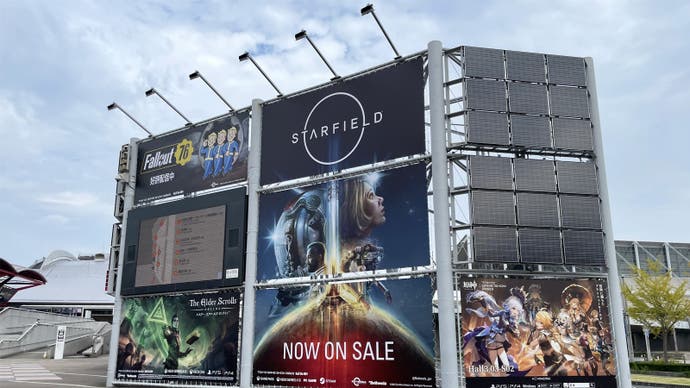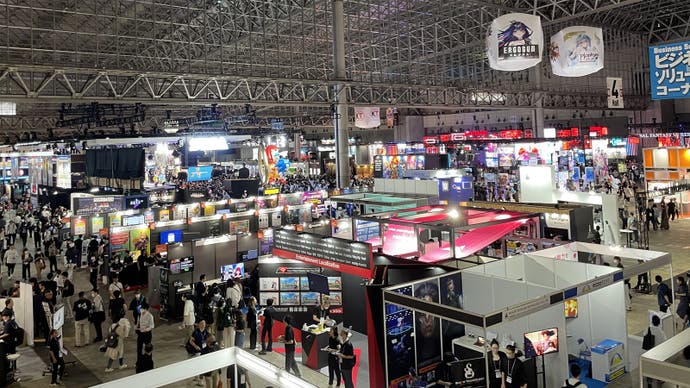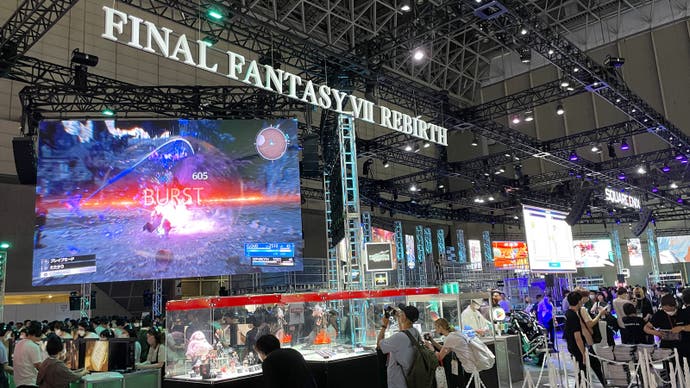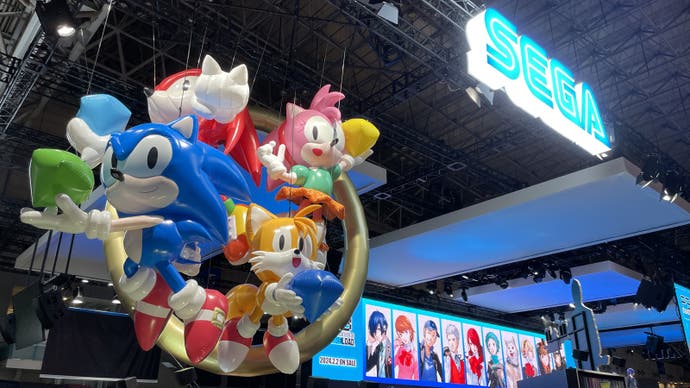With E3 dead and Japanese games better than ever, Tokyo Games Show is a fascinating place to visit
Makuhari messy.
For many, E3 is considered the magical place where the video games industry comes together, for a show jam-packed with exciting game announcements, demos and exclusive access to developers from all over the world. For me, however, the one event in the games industry calendar that has always held the most fascination is Tokyo Game Show.
I grew up as a Sega kid, and was fascinated by the company's stream of console games coming out of Japan. I looked forward to TGS, as you could always expect the biggest announcements from the Tokyo-based company there (unlike the Kyoto-based Nintendo, which traditionally favoured E3, outside of rare exceptions such as Satoru Iwata's reveal of the Wii remote at TGS 2005).
With E3's cancellation this summer (and perhaps forever, though the ESA claims it still plans to 'reinvent' the show for 2025), this year felt an opportune time to finally make the TGS pilgrimage, in a year where the show returned to full size at its home in Tokyo's Makuhari Messe for the first time since the pandemic. 243,238 people attended over four days - less than the show's 2018 peak, but still an impressive number considering the country's return from Covid restrictions, amidst the ongoing bounceback of the Japanese games industry as a whole. Keiji Inafune infamously declaring the games industry "finished" 14 years ago now feels like a long time in the past.
Still, it's not until you're there in person that you appreciate the difference between perception and reality. I had already been made aware of this beforehand but, despite the name, TGS isn't actually in Tokyo itself. The Makuhari Messe is all the way out in Chiba - technically a different prefecture despite still being part of the Greater Tokyo region. Sure, it's similar to venues like the Birmingham NEC, or ExCel London being outside each city's centres, but we're still talking a hell of a commute. And it's far further out of town than Gamescom's Cologne-based Kolnmesse (whose German word for 'trade fair', messe, inspired the Makuhari Messe's name).
Even once you're out of the nearest station, you still have a trek to the venue itself, where you'll notice Microsoft and HoyoVerse as the show's big spenders, covering billboards with Bethesda games and Genshin Impact. Samsung, meanwhile, recruited a host of iconic game characters to advertise its 990 Pro SSD. Temperatures were absolutely sweltering, too, enough that you broke a sweat just standing around in queues, never mind traipsing about between halls. Some exhibitors were wise enough to at least keep their PC rigs cool with additional electrical fans, while full air conditioning was reserved for the considerably smaller business area.
Perhaps a more pressing issue, though, was what exactly TGS 2023 would offer - for me and the wider games industry. Let's be clear, the Japanese industry has had a real renaissance these last few years, when you include both critically and commercially acclaimed releases like Tears of the Kingdom and Elden Ring. There has also been newfound international appreciation for once-niche franchises like Persona and Yakuza / Like A Dragon. On home turf of course, they're bigger than ever, as you can tell from how packed the Sega and Atlus booths are within seconds of doors opening.

However, many of these titles had already made their playable debuts at Gamescom in August, while their first newsworthy announcements were made even earlier in the summer. Even with the show's biggest games, the sense you're getting a world exclusive first look in the same way thousands flocked to E3 for exclusive access is somewhat deflated by several publishers electing to hold local press events back in the West for media not able to make the journey. You do have to then appreciate RGG Studio for ensuring its native audience would get an exclusive first playable version of Like A Dragon: Infinite Wealth, albeit something only confirmed to me just hours before the show began.
I once overheard a peer say you could do TGS in a day, which sounds rather disparaging and dismissive of a show that has over 700 exhibitors from around the world in attendance. Still, it's also not completely inaccurate, when you consider what there is to cover that most Western media and audiences are actually interested in engaging with. Still, as someone with a deep investment in Japanese games, and seeing just how stacked the Q1 2024 release schedule is already looking for JRPGs alone, TGS was surely the place to speak to these developers on their home turf, or so I assumed.
I don't want to get too inside-baseball about covering a large games show, but press typically have appointments to see a game or interview a developer or spokesperson, and these are arranged in advance to keep everything nice and organised. But despite TGS being split into business days and public days, with a business area away from the public showfloor, the majority of games were just in the public area, so without being able to book appointments, you really do just have to stand in line for hours while wondering whether you'll make that interview you had an appointment for.

While short of exclusives, TGS at least puts on a proper show. You can watch someone dressed in a Sonic costume dancing along with a row of back-up dancers as you wait to play Sonic Superstars, have a gander at the new pricey figurines of Final Fantasy 7 characters as you wait to play Final Fantasy 7 Rebirth, or be rewarded with a limited edition T-shirt after playing the Metal Gear Solid: Master Collection demo. Each of the big-name booths is like an event unto itself, with many companies ensuring attendees leave with a goodie bag - so impractically large, I can't help notice, that they turn those holding them into walking billboards on their way home.
Save for a few exceptions, trying to actually talk with Japanese developers on the show floor is tough (although I did manage to just bump into Yakuza creator Toshihiro Nagoshi). In the rather overlooked indie area (sidelined, alongside VR), I ran into members of Team Reptile demoing the recently released Bomb Rush Cyberfunk, while other Western developers showcased games at the Sega booth, as the company acts as a more general publisher for the Japan and Asia market.
I also saw RGG Studio director Masayoshi Yokoyama, as well as Persona producer Ryota Niitsuma and Vanillaware's Takashi Noma, director of Unicorn Overlord. But these were during stage appearances at RGG and Atlus' presentations held the day before TGS, with no opportunity to personally grill them afterwards. Still, there was still personal value being in the room for these things, as the Atlus media briefing included live performances from a string band playing music from 13 Sentinels: Aegis Rim, proving to be a taster of a full orchestral concert announced for next January in Japan, while Persona 5 vocalist Lynn also belted out a few songs.

Throughout, the language barrier remained, and while I knew Atlus' presentation would be Japanese-only, I had still wanted to go in the hopes there would be more information regarding the much-anticipated Metaphor ReFantazio - the next game from the Persona series veterans at Studio Zero. Alas, there has been no new info since the game's trailer debuted at the Xbox conference in June, which suggests to me it won't arrive until the latter half of 2024. Meanwhile, the only way to keep up with the RGG Fall Summit I attended was to play the livestream's audio translation from my phone (not helped by awful Wi-Fi reception, a huge time lag and imperfect translation).
It's easy to focus on all this and question the need to attend a show that doesn't make itself easy to cover. But beyond the spectacle, it was clear to me that TGS remains relevant as a hub for doing business in Japan. Video game companies host parties and mixers before and during the event giving industry attendees an excuse to meet up and chat about things not on the show floor (although, despite keeping my ear to the floor, I'm still waiting to hear the details on Sega's mysterious 'Super Game'). In-person business meetings meanwhile had Western companies helping out Japanese developers, and vice versa. One expat developer I met was out celebrating, as they'd just locked in a contract with an overseas publisher at the show. With E3 out of action, TGS feels an even more attractive place for international deals to be done.
And then there's Tokyo itself, of course. My favourite city in the world, and a place where you can find gaming culture anywhere - be it a tucked-away bar, a charming game-themed cafe, or a retro game shop where you can still find the odd rare artefact simply lying around. I didn't need to visit Tokyo Games Show to confirm Japanese games are better now than they've ever been. And, despite some of the difficulties of attending, TGS remains a fascinating show to me.


